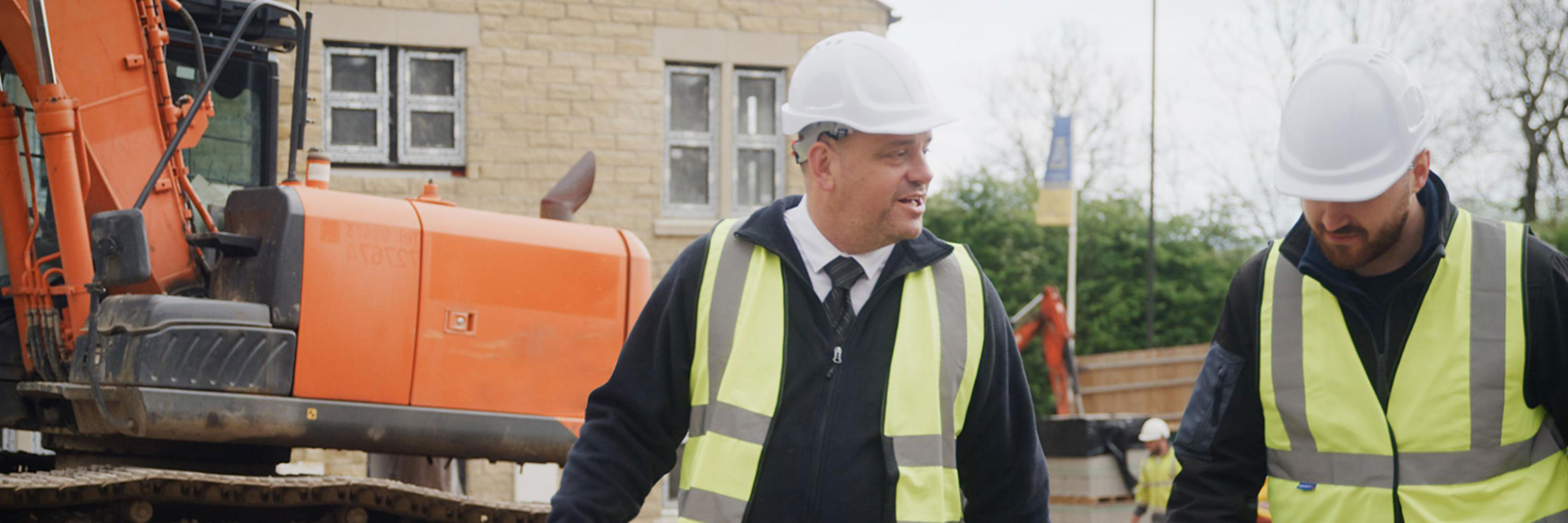making a career change into the construction industry.
latest construction jobs-
making a career change into the construction industry.
-
 04 July 2022
04 July 2022from an unfulfilling corporate role to a new career in construction.
Shaun faced a difficult work culture and experienced workplace bullying. Landing his dream construction role with Vinci completely transformed his mental wellbeing for the better.
-

a drastic career shift from opera singer to site manager.
Former opera singer Kate decided to follow her heart and pursue a career in construction and now works as a site manager for Morgan Sindall.
-

a new career as a quantity surveyor.
Calum, an experienced quantity surveyor at Morgan Sindall shares his advice to those looking to pursue a career as a quantity surveyor.
-

interview question tips for site manager jobs.
If like Kate, you're looking to become a site manager, whether that be a new career change or career progression, our article will give you all of the advice and tips you need to nail your interview.
let's find work.
our industry specialisms.
construction jobs overview.
we have thousands of construction jobs to offer you. Below are key construction career insights for our top jobs.
-
project managers
Construction projects are structured and have multiple moving parts. For instance, building a residence or shopping mall comprises numerous steps requiring a construction project manager to coordinate the process.
Essentially, construction project managers, organise and bring together the necessary resources to complete a building. Unlike other projects, constructions are mission-based and have a variety of constraints unique to the building design. Consequently, being the project coordinator for a residential building isn't the same as a commercial property.
The types of construction project managers depend on the employer or the project. A construction project manager working for a contractor to oversee a project is often based at the construction site. If that is the case, the job of a construction project manager is to supervise other employees on the site and manage resources on behalf of the contractor.
-
site managers
The duties of a Site manager usually begin before the construction project even starts. The job of a site manger is to essentially supervise a construction site and run construction projects.
A site manager will be required to set out the site, position vehicles and equipment as required, and organise various facilities to ensure the location meets various health and safety standards. A crucial site manager duty is to ensure the project will meet the builder's specifications, budgets and allotted time.
Site managers are also required to liaise with various personnel, clients and the general public as required. In addition to this, they will often need to supervise staff members, motivate the overall workforce, solve problems that are occurring on the site and meet with various workers to discuss their needs.
-
labourer
Labourers are employed to work on construction sites and typically carry out everything from bricklaying, carpentry and plastering to digging trenches. While being a labourer is an enjoyable role, it can be a physically demanding job and you need to be fit to do it. The working environment of a labourer is often weather dependent and could be split between working outside in the sun or during winter, possibly even the snow!
One of the great advantages about becoming a labourer is that you don’t need any experience as such. Most labourers learn on the job or through an apprenticeship. Many employers do expect you to have some experience so if you haven’t undertaken an apprenticeship you’ll need to sharpen up your skills elsewhere. It's the perfect opportunity to begin a progressive career in construction.
-
quantity surveyor
Quantity surveyors work within the land management, property and construction industries. They are the people responsible for calculating and managing the costs relating to projects, from helping create initial estimates to finalising the complete budget requirements. One of the many advantages to becoming a quantity surveyor is that no two projects are ever the same and there is a great deal of variety, which can be quite interesting for someone who enjoys a diverse role.
Quantity surveyors usually spend a lot of their working day preparing tender and contract documents, carrying out cost analysis, monitoring cost variations and writing reports, finding out the client requirements and undertaking feasibility studies, allocating work to subcontractors and making payments. Site visits are also a big part of the job for a quantity surveyor, where they are required to make assessments on financial projections for future work.
-
maintenance engineer
While the role of a maintenance engineer is complex, in short; maintenance engineers apply engineering concepts to ensure the smooth running of industrial machinery and equipment. Some of the activities include installing, repairing and maintaining different types of equipment. Using specialised equipment, maintenance engineers monitor and diagnose machine failures. In case of breakdowns, it is a maintenance engineer’s job to restore the faulty equipment and ensure optimal performance.
A career as a maintenance engineer allows an individual to work in mechanical repair workshops or companies dealing with machinery and equipment maintenance. Aside from working for consultancy companies, there could be the opportunity to work in-house in large factories, manufacturing plants and various industries, including automotive, oil and gas and electronic businesses.
FAQs in construction.
-
what construction work pays the most?
The construction industry remains one of the highest paying sectors in the UK, with the average salary at £42,732 per year or £21.91 per hour.
Working on construction projects generally require individuals to perform a small but vital part within a larger team, and as such offers opportunities in a variety of roles, from site managers, project managers, labourers and surveyors.
Those with the broadest skillset are the most likely to land higher paying jobs as they require individuals to be able to see the bigger picture and longer term objectives within a construction project.
However, while the salaries of most manual labourer careers in construction, such as carpentry or bricklaying, have increased since the pandemic, it’s worth noting that those who develop a highly specialised skillset within those areas will be able to progress their salaries to rival those roles which require more academic certifications to land. Especially those entrepreneurially minded enough to start their own company.
Construction is a booming industry that will always be in need of hard working employees.
Senior project manager
The national average salary for a Senior Construction Project Manager is £75,673 in the United Kingdom.
Senior Project Managers are responsible for the completion of the construction project and so must oversee all areas of the project, including directly consulting with the architect, delegating to junior project-managers, and coordinating labourers. It’s necessary to have experience in all aspects of construction in order to fully perform this role, to ensure the smooth and cost-effective running of the project.
Senior quantity surveyor
The national average salary for a Senior Quantity Surveyor is £57,450 per year in United Kingdom.
Senior Quantity Surveyors are experts in construction costs and contracts, and their job ranges from estimating the cost of a project, calculating risk and offering contractual advice, to hands-on project management. They work closely with architects and designers to estimate the price of a design and with project managers to keep the project within budget.
Commercial manager
The average Commercial Manager salary in the UK is £52828 annually, ranging from £29379 to £84500. Typically, around £75,000 based on our current openings.
The commercial manager oversees the finances and budget constraints within a construction project and they manage the duties of their commercial team. Usually, Commercial Managers will have a background in Quantity Surveying or possibly engineering. It’s necessary to not only have extensive understanding of the construction industry but to also be a good negotiator with an eye for finances and areas of commercial profit.
Architect
Average Salary £52,500
Architects are responsible for the blueprints of new construction projects. Their main tasks are to ensure that the building is safe, functional and, where possible, aesthetically pleasing. Architects will often need to be on hand during the production, as blueprints will require changes due to time and budget restraints or changes in the client’s needs.
-
what is the easiest type of construction job?
For those wanting to get into construction with little or no experience can look at becoming a labourer.
A labourer is a worker who provides the physical labour required by a foreman, contractor or project manager. Labourers are often the most important link between a business plan and their physical capacity to complete construction and other projects. Manual labour is the key focus of this profession, so prior experience or trade skills aren't always necessary. Being able to move and do strenuous activities is vital in the role.
Not every project is the same for a labourer, so they require diverse skills. A labourer working with a blacksmith, for example, gains the skills of blacksmiths. Since labourers do the essential jobs needed by a site manager, they often find great opportunities for promotion.
According to ONS, a labourer earns an average salary of £22,425 per year, which translates to £11.50 per hour. Entry-level positions attract £21,215 per year, while experienced labourers earn 27,224 annually. Full-time workers enjoy various benefits, including medical and life insurance. When you work overtime, your earnings are higher than for regular shifts.
Construction managers, supervisors and contractors are professionals who often started as labourers. As long as you're willing to listen and learn, your manager and employer will give you valuable knowledge, leading to future promotions.
-
what is the job of a construction worker?
The term construction worker can be used to cover a huge number of roles within the industry, but usually refers to blue collar workers performing ‘hands on tasks’. There are of course many different roles within construction which require site based or office based working environments, for example a quantity surveyor.
-
what is the best paid job in construction UK?
Managing Quantity surveyors are currently the best paid job in construction in 2022. Looking at current job openings on randstad.co.uk, the salary for a managing quantity surveyor is between £90,000 and £100,000.
Looking at historic data over the past two years, in the 12 months leading up to the 1st February 2020, there was a 3% increase in average Quantity Surveyor pay, rising from £54,750 to £56,250.
Pay for Senior Quantity Surveyors is up 9%, from £66,000 to £72,500. Average M&E Quantity Surveyor salaries have risen 6%, from £77,250 to £81,750. Highfliers can do even better. In September, we placed a Senior Quantity Surveyor on the south coast on almost £85,000.
There are of course regional differences. The quantity surveyor job markets in Birmingham and Brighton are busier for example.
The trend in London is particularly interesting. Until relatively recently, quantity surveyor salaries in London were approximately a fifth 20% higher than outside the capital (19% more in 2017, 21% in 2018).
latest construction insights.
see all articles-
 21 March 2025
21 March 2025negotiating a pay rise in the trades and labour industry.
-
 13 March 2025
13 March 2025questions to ask in a site engineering interview.
-
 19 February 2025
19 February 2025how to craft a standout CV for site engineering roles.
-
 19 February 2025
19 February 2025questions to ask in a trades and labour interview.
-
 16 January 2025
16 January 2025how to craft a standout CV for trades and labour roles.
-
 29 November 2024
29 November 2024ace your teaching job application: a comprehensive guide to success.









